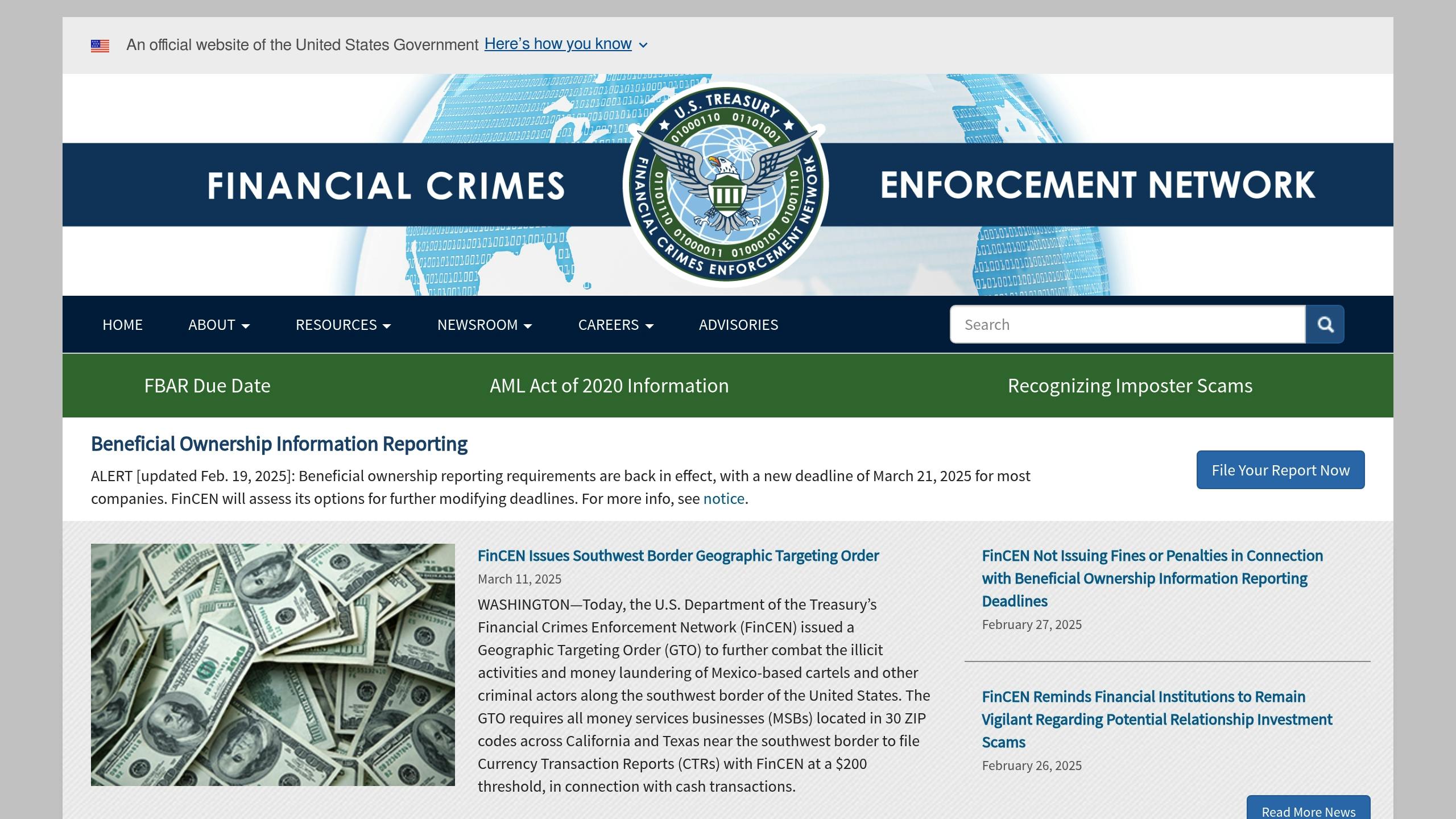- Big Risks: Non-compliance can lead to fines averaging $145M, license revocation, or even federal prosecution.
- Key Regulations: Follow FinCEN guidelines, BSA/AML rules, and state-specific payment laws.
- Payment Options: Use compliant methods like ACH transfers (reliable) or cash (costly). Avoid risky options like PIN debit or point-of-banking systems.
- Boost Revenue: Non-cash payments increase average cart size by 30% ($112 vs. $22 for cash).
- Security: Protect POS systems with encryption, multi-factor authentication, and regular updates.
- Record-Keeping: Maintain transaction logs, tax filings, and compliance reports for at least 3-4 years.
Quick Compliance Checklist:
- Daily Tasks: Verify IDs, enforce purchase limits, and log all transactions.
- Monthly Reviews: Reconcile bank statements, monitor tax filings, and assess risks.
- Quarterly Audits: Review state/federal compliance, update staff training, and test systems.
- State Integration: Sync POS systems with platforms like METRC or BioTrack for real-time reporting.
Stay compliant to protect your business and maximize revenue in the $45B cannabis market!
Banking Marijuana: A Primer For Banks, Financial Services ...
Federal Payment Rules for Cannabis
Federal laws play a major role in shaping how dispensaries handle payments in 2025, even as cannabis remains legal in many states.
FinCEN Guidelines Explained

The Financial Crimes Enforcement Network (FinCEN) outlines how financial institutions can work with cannabis businesses while staying within federal rules. Their guidance focuses on transparency and managing risks.
Here’s what financial institutions must do:
- Customer Due Diligence: This involves verifying state licenses, reviewing dispensary paperwork, monitoring public sources for negative information, and understanding the business’s normal operations.
- Risk Assessment Protocol: Institutions assess risks by reviewing key documents.
| Risk Category | Documents Needed |
|---|---|
| Licensing | Up-to-date state permits and registrations |
| Operations | Sales records and inventory logs |
| Ownership | Background checks for all owners |
| Location | Proof of compliance with zoning laws |
"This FinCEN guidance clarifies how financial institutions can provide services to marijuana-related businesses consistent with their BSA obligations, and aligns the information provided by financial institutions in BSA reports with federal and state law enforcement priorities." - FinCEN
The next step is understanding how BSA and AML regulations impact payment compliance.
BSA and AML Requirements
In addition to FinCEN’s framework, the Bank Secrecy Act (BSA) and Anti-Money Laundering (AML) rules govern every transaction, ensuring dispensaries meet federal standards.
Suspicious Activity Reports (SARs):
Financial institutions must submit one of three SAR types depending on the nature of the activity:
| SAR Type | Trigger | Details Needed |
|---|---|---|
| Marijuana Limited | Routine operations | Basic business details and proof of state compliance |
| Marijuana Priority | Suspicious activity | Transaction specifics and any Cole Memo violations |
| Marijuana Termination | Account closure | Explanation for termination and related risks |
Key Compliance Steps:
- Monitor transactions for unusual patterns.
- File Currency Transaction Reports (CTRs) for cash deposits over $10,000.
- Keep detailed records of all financial activity.
- Verify the source of funds for large investments or deposits.
Red Flags to Watch For:
- Revenue that’s unusually high compared to similar businesses.
- Structured deposits designed to bypass reporting limits.
- Transactions involving other states or countries.
- Unverifiable funding sources.
"The obligation to file a SAR is unaffected by any state law that legalizes marijuana-related activity." - FinCEN
While enforcement tends to focus on major violations, dispensaries must maintain thorough records and reporting to prove compliance with federal standards.
State Payment Laws
Navigating state payment regulations is a challenge for dispensaries in 2025. With 24 states now permitting recreational cannabis sales, understanding and complying with local rules is a must.
Meeting State Requirements
Every state has its own set of payment processing guidelines, layered on top of federal regulations. Here’s a breakdown of the most common requirements:
| State Requirement | Description | Common Examples |
|---|---|---|
| Transaction Limits | Maximum purchase amounts allowed | $3,000 per day in New York (varies by state) |
| Payment Methods | Approved ways to pay | Cash, ACH transfers, state-approved digital payments |
| Reporting Frequency | How often transaction data is submitted | Daily in most states; real-time in others |
| Tax Collection | Cannabis-specific tax rates | Ranges from 10% to 37%, depending on the state |
Take New York as an example. With its licensed dispensaries expected to grow from 275 to over 625 and a projected $1.5 billion market, the state now requires comprehensive digital payment tracking.
"Digital and cashless payment methods would have significantly helped cannabis businesses monitor cash flow and accounting transactions, improve business safety, make tax payments easier, and improve customer transactions."
– Gerald Lombardo, Head of Growth at Popl
Dispensaries need to ensure their payment systems are integrated with state-mandated tracking platforms to meet these requirements.
State Tracking System Setup
Integrating with state tracking platforms is non-negotiable for compliance. States outline transaction protocols and influence the choice of POS systems. Here’s how dispensaries can get started:
-
System Selection
- Pick POS systems that align with state tracking needs.
- Ensure compatibility with systems like METRC, Leaf Data Systems, or BioTrack.
-
Core Functions
- Configure the system for real-time transaction reporting.
- Enforce purchase limits.
- Reconcile product tracking with state databases.
-
Audit Requirements
- Prepare for regular state-mandated audits.
- Keep integrations up to date.
- Stay informed about new regulations.
With the cannabis market expected to hit $45 billion by 2025, states are stepping up their monitoring efforts. For dispensaries, staying compliant isn’t just about following rules - it’s about staying competitive.
sbb-itb-72191b9
Payment Processing Standards
Cannabis sales are expected to reach $45 billion by 2025. As state systems evolve, ensuring secure payment options is a crucial next step.
Choosing Legal Payment Processors
Dispensaries must work with payment processors that align with federal regulations. Currently, federal rules prevent major credit card networks from handling cannabis transactions.
| Payment Method | Compliance Status | Key Considerations |
|---|---|---|
| ACH Transfers | Fully Compliant | Reliable alternative to cash, allows direct bank transfers |
| Point of Banking | Not Compliant | Risk of sudden shutdown, violates network policies |
| PIN Debit | Not Compliant | Legal risks due to network rule violations |
| Cash | Fully Compliant | High handling costs (4-15% of revenue) |
When selecting a processor, focus on:
- Compatibility with your existing POS system
- Clear, upfront pricing with no hidden fees
- Short-term, flexible contracts
- Verified regulatory compliance
- Quick and efficient settlement processes
After choosing a compliant processor, make sure your POS system meets strict security standards.
POS System Security
Dispensaries are increasingly targeted by cybersecurity threats. To protect sensitive data, implement tools like end-to-end encryption and advanced verification protocols.
Key security measures include:
- End-to-end encryption for all transaction data
- Zero Trust Architecture with ongoing verification
- Multi-factor authentication for accessing systems
- Regular updates, patch management, and cloud backups
"With the assistance of AI, attackers can quickly identify weak points in API implementations, making these threats particularly challenging to mitigate." - Infosecurity Magazine
Managing Cash and Digital Payments
Combining secure cash handling with digital payment options can provide a significant boost. Offering alternatives to cash has been shown to increase revenue by 30%.
-
Cash Operations
Automate cash drawer processes, use POS systems with built-in counting features, and keep detailed transaction logs. -
Digital Payments
Set up ACH payment processing, monitor daily transaction settlements, and have backup payment solutions ready.
The move toward cashless payments is growing. For example, 83% of Americans aged 30-50 prefer using debit or credit cards for everyday purchases. Balancing cash and digital payment management not only supports compliance but also improves operational efficiency.
Risk Management Steps
Managing risks in cannabis payment processing requires well-defined protocols, thorough training, and accurate record-keeping. By following established payment processing standards, these measures help reduce regulatory risks and ensure secure transactions. Interestingly, dispensaries with strong risk management practices reportedly earn an average of $4,627 more with debit payments than cash-only operations.
Building a Compliance Plan
Developing a compliance plan begins with setting clear procedures and verification systems. Key elements include:
| Component | Implementation Steps | Monitoring Requirements |
|---|---|---|
| License Management | Track renewals monthly and store documentation | Review compliance quarterly |
| Payment Processing | Vet partners, review contracts, test integrations | Monitor transactions daily |
| System Security | Set up encryption and access controls | Conduct weekly security audits |
| Risk Assessment | Perform quarterly evaluations and gap analysis | Generate monthly risk reports |
Staff Training and Checks
Faai Steuer, VP of Marketing at Cova Software, highlights the importance of standard operating procedures (SOPs) in compliance:
"In terms of compliance, cannabis dispensary SOPs can help you respond to our industry's constantly shifting regulations. When the rules change, it's easier to update your documentation practices and job descriptions."
Training should emphasize:
- Daily Transaction Protocols: Customer ID verification and purchase limit enforcement
- Compliance Updates: Regular sessions on regulatory changes
- Security Measures: Proper handling of payment data and cash
- Emergency Procedures: Steps to address compliance breaches or system failures
Effective training ensures accurate record-keeping, which is key to staying compliant.
Financial Record Requirements
Oregon State Guidelines require dispensaries to keep detailed financial records for at least three years. These records should include:
- Transaction Records: Full documentation of sales, including invoices, dates, and amounts
- Bank Statements: Monthly reconciliations with internal records
- Tax Documents: Quarterly and annual filings with supporting documentation
- Audit Trail: Logs of all payment processing activities
Data reveals that dispensaries offering payment options beyond cash see a 30% increase in average cart size. This makes thorough financial documentation even more essential for accurate tracking and reporting.
Andrew Pierce, CEO at LLC Attorney, underscores the value of good accounting software:
"Good accounting software for a cannabis business should allow business owners to keep operations efficient and effective, from managing their cash flow properly, maintaining compliance, accounting for taxes, and accessing financial records in the cloud."
Incorporate these records into regular compliance reviews to strengthen your payment compliance framework. Frequent evaluations of these risk management practices help maintain a solid foundation for secure operations.
Payment Compliance Checklist
Regular Compliance Reviews
To ensure your operations stay aligned with regulations and avoid penalties, it's essential to conduct timely reviews. Use this checklist to strengthen your compliance framework:
| Review Type | Frequency | Key Components | Documentation |
|---|---|---|---|
| Daily Checks | Every business day | Transaction limits, ID verification, cash handling | Digital logs |
| System Audits | Weekly | POS integration, payment gateway status, security protocols | Technical reports |
| Financial Review | Monthly | Bank statements, tax compliance, transaction reconciliation | Financial statements |
| Full Compliance | Quarterly | State/federal regulations, staff certifications, system updates | Audit reports |
To meet state requirements, integrate your compliance reviews with mandated tracking systems. Maintain thorough documentation for:
- Payment transaction records
- Bank statements and reconciliations
- Tax documentation and filings
- Employee training certifications
- System security protocols
These reviews directly support the record-keeping practices outlined below.
Record-Keeping Guide
Accurate and well-organized records are the backbone of compliance. State regulations require cannabis businesses to maintain specific financial and operational documentation.
Key Financial Records to Retain:
- Sales transactions (retain for 4 years)
- Bank statements and reconciliation reports
- Tax filings and related documents
- Payment processor agreements
- Employee training and certification records
Transaction Documentation Must Include:
- Customer verification details
- Date and time of transaction
- Payment method and amount
- Applied taxes and fees
- Batch tracking numbers
"Cannabis licensees are responsible for keeping records that clearly reflect all financial transactions and the financial condition of the business."
Digital Record Management Best Practices:
-
System Integration
Ensure your POS system syncs with state tracking platforms. This enables real-time monitoring, automated reporting, and a clear audit trail. -
Security Protocols
Implement encryption, regular backups, strict access controls, and detailed activity logs to protect sensitive data. -
Reporting Systems
Set up automated reporting for daily summaries, monthly financials, quarterly audits, and annual tax filings.
"A cannabis business shall maintain a system of recordkeeping that will permit the identification for purposes of recall of any batch of cannabis or lot of cannabis products from consumers when such cannabis items are found to be unsafe for use."
Conclusion
2025 Compliance Summary
The cannabis industry continues to face growing pressure to meet strict payment compliance standards. With financial institutions remaining cautious, dispensaries must establish clear and effective compliance systems to operate successfully.
Key areas to address include:
| Area | Key Requirements | Action Urgency |
|---|---|---|
| Payment Processing | Digital solutions, ACH transfers, secure POS | Immediate |
| Financial Records | Transaction logs, tax documentation, audit trails | Daily/Weekly |
| Staff Management | Compliance training, certification tracking | Monthly |
| System Security | Payment gateway monitoring, encryption protocols | Continuous |
Digital and cashless payment options are now essential for managing operations. They simplify cash flow tracking, tax payments, and customer transactions. With these systems in place, businesses can shift their focus toward upcoming regulatory challenges.
Preparing for Changes
To stay compliant in 2025 and beyond, dispensaries must take proactive steps.
"As 2025 progresses, the question is not whether the cannabis industry will continue to grow, but how well it will navigate the complexities of compliance to unlock its full potential. By staying informed and proactive, businesses can position themselves as leaders in a rapidly changing landscape".
Here’s how dispensaries can prepare:
- Technology Integration: Use scalable payment tools and cloud-based accounting software to handle cash flow, tax requirements, and compliance efficiently.
- Financial Partnerships: Partner with regional banks or credit unions familiar with cannabis operations. While banking hurdles remain, strong financial relationships are crucial for stability.
- Compliance Monitoring: Keep up with regulatory updates and industry trends. Regular audits, staff training, and compliance checks should be part of your routine.


